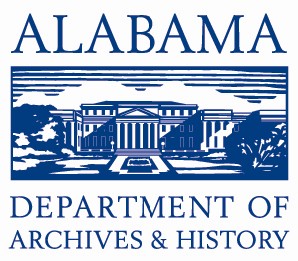from Apr. 15, 1865
Proclamation! By Mayor Senter
-
Full Title
Proclamation! By Mayor Senter
-
Description
News of Lincoln's death by assassin reached Cleveland via telegraph at 7:30 AM on Saturday April 15, 1865. At 9:00 AM Mayor George B. Senter issued a proclamation to the citizens of Cleveland announcing the "overpowering calamity that has befallen this nation." He asked that all businesses be closed and that all citizens gather on Public Square that afternoon at 3 PM to mourn "the loss of the head of our nation, and its Premiere, Secretary Steward." Steward would survive his attack. Senter had been mayor in 1861 when Lincoln had visited on his way to his inauguration. Less than two weeks later, Public Square would be the site of another gathering of citizens to view the body of the slain President.
-
Source
www.wrhs.org
-
Rights
Permission for personal and research use; publication or reproduction requires written permission from the Western Reserve Historical Society.
-
Tags
-
Cite this Item
George B. Senter. "Proclamation! By Mayor Senter". City of Cleveland. Remembering Lincoln. Web. Accessed October 29, 2025. https://rememberinglincoln.fords.org/node/221
-
Creator
George B. Senter
-
Publisher
City of Cleveland
-
Date
April 15, 1865
from Apr. 15, 1865
Proclamation! By Mayor Senter
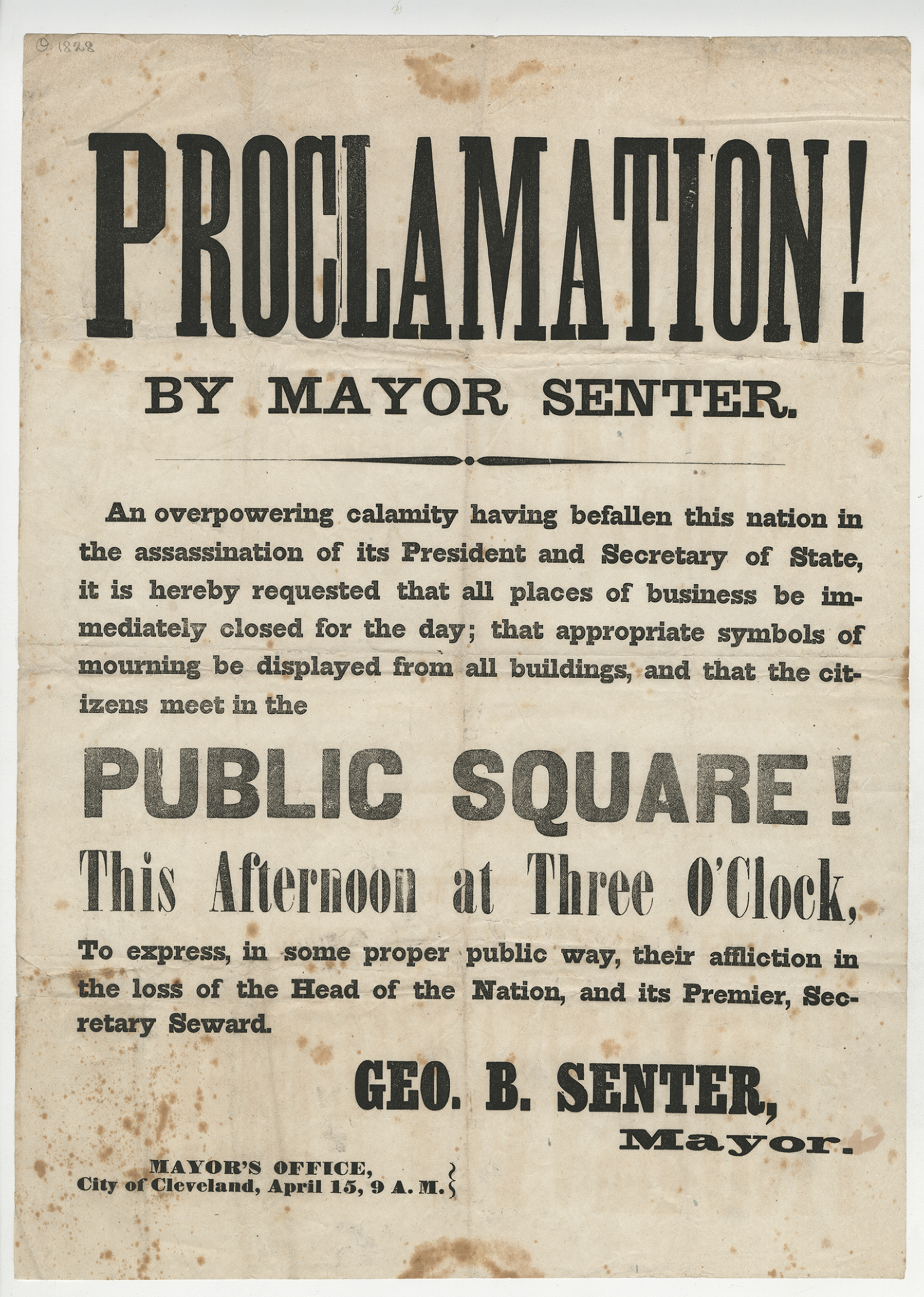
-
Description
News of Lincoln's death by assassin reached Cleveland via telegraph at 7:30 AM on Saturday April 15, 1865. At 9:00 AM Mayor George B. Senter issued a proclamation to the citizens of Cleveland announcing the "overpowering calamity that has befallen this nation." He asked that all businesses be closed and that all citizens gather on Public Square that afternoon at 3 PM to mourn "the loss of the head of our nation, and its Premiere, Secretary Steward." Steward would survive his attack. Senter had been mayor in 1861 when Lincoln had visited on his way to his inauguration. Less than two weeks later, Public Square would be the site of another gathering of citizens to view the body of the slain President.
-
Source
www.wrhs.org
-
Rights
Permission for personal and research use; publication or reproduction requires written permission from the Western Reserve Historical Society.
-
Creator
George B. Senter
-
Publisher
City of Cleveland
-
Date
April 15, 1865
from Jul. 3, 1865
"Mr. Davis and the Assassination."
-
Full Title
"Mr. Davis and the Assassination."
-
Description
Brief report of Jefferson Davis's response to the death of President Lincoln: "Mr. Davis said that he deplored the event, and trusted that an investigation would prove that no Southern man had any connection with it." Originally published in the Lynchburg Virginian; reprinted in the Montgomery Daily Post on July 3, 1865.
-
Source
Excerpt from the Montgomery Daily Mail, book number ADVCOL39. Catalog record for this title is available here.
-
Rights
Use of this item for research, teaching and private study is permitted with proper citation and attribution, as defined here. Reproduction of this item for publication, broadcast or commercial use requires written permission. For permission, please contact the Alabama Department of Archives and History.
-
Tags
-
Cite this Item
Montgomery Daily Post. ""Mr. Davis and the Assassination."". Remembering Lincoln. Web. Accessed October 29, 2025. https://rememberinglincoln.fords.org/node/211
from Jul. 3, 1865
"Mr. Davis and the Assassination."

-
Description
Brief report of Jefferson Davis's response to the death of President Lincoln: "Mr. Davis said that he deplored the event, and trusted that an investigation would prove that no Southern man had any connection with it." Originally published in the Lynchburg Virginian; reprinted in the Montgomery Daily Post on July 3, 1865.
-
Source
Excerpt from the Montgomery Daily Mail, book number ADVCOL39. Catalog record for this title is available here.
-
Rights
Use of this item for research, teaching and private study is permitted with proper citation and attribution, as defined here. Reproduction of this item for publication, broadcast or commercial use requires written permission. For permission, please contact the Alabama Department of Archives and History.
-
Creator
Montgomery Daily Post
-
Date
July 3, 1865
from May. 1, 1865
"Further Particulars of the Washington Tragedy."
-
Full Title
"Further Particulars of the Washington Tragedy."
-
Description
Dispatches reporting events after the assassination of President Lincoln. They give details about the attacks on the presidents and Secretary of State Seward; Lincoln's death and Seward's recovery; the inauguration of President Johnson; the surrender of Confederate forces to General Sherman; and the capture of John Wilkes Booth. The reports were reprinted in the Montgomery Daily Mail on May 1, 1865.
-
Source
Excerpt from the Montgomery Daily Mail, book number ADVCOL39. Catalog record for this title is available here.
-
Rights
Use of this item for research, teaching and private study is permitted with proper citation and attribution, as defined here. Reproduction of this item for publication, broadcast or commercial use requires written permission. For permission, please contact the Alabama Department of Archives and History.
-
Tags
-
Cite this Item
Montgomery Daily Mail. ""Further Particulars of the Washington Tragedy."". Remembering Lincoln. Web. Accessed October 29, 2025. https://rememberinglincoln.fords.org/node/210
from May. 1, 1865
"Further Particulars of the Washington Tragedy."
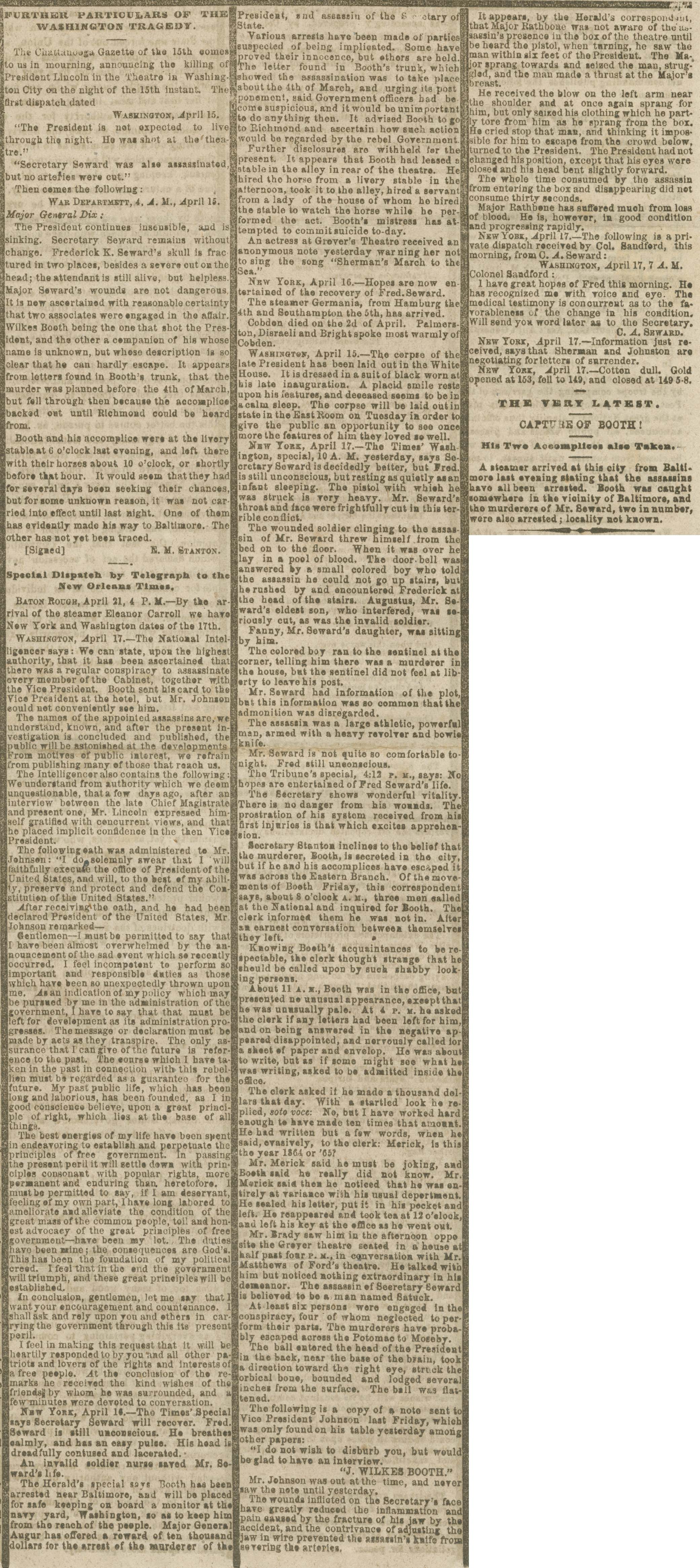
-
Description
Dispatches reporting events after the assassination of President Lincoln. They give details about the attacks on the presidents and Secretary of State Seward; Lincoln's death and Seward's recovery; the inauguration of President Johnson; the surrender of Confederate forces to General Sherman; and the capture of John Wilkes Booth. The reports were reprinted in the Montgomery Daily Mail on May 1, 1865.
-
Source
Excerpt from the Montgomery Daily Mail, book number ADVCOL39. Catalog record for this title is available here.
-
Rights
Use of this item for research, teaching and private study is permitted with proper citation and attribution, as defined here. Reproduction of this item for publication, broadcast or commercial use requires written permission. For permission, please contact the Alabama Department of Archives and History.
-
Creator
Montgomery Daily Mail
-
Date
May 1, 1865
from May. 1, 1865
Military orders issued in Montgomery
-
Full Title
Military orders issued in Montgomery, Alabama, after the death of President Lincoln.
-
Description
The orders officially announce the assassination; close public offices and businesses; and arrange for other gestures of mourning. Published in the Montgomery Daily Mail on May 1, 1865.
-
Source
Excerpt from the Montgomery Daily Mail, book number ADVCOL39. Catalog record for this title is available here.
-
Rights
Use of this item for research, teaching and private study is permitted with proper citation and attribution, as defined here. Reproduction of this item for publication, broadcast or commercial use requires written permission. For permission, please contact the Alabama Department of Archives and History.
-
Tags
-
Cite this Item
Montgomery Daily Mail. "Military orders issued in Montgomery, Alabama, after the death of President Lincoln.". Remembering Lincoln. Web. Accessed October 29, 2025. https://rememberinglincoln.fords.org/node/209
from May. 1, 1865
Military orders issued in Montgomery, Alabama, after the death of President Lincoln.
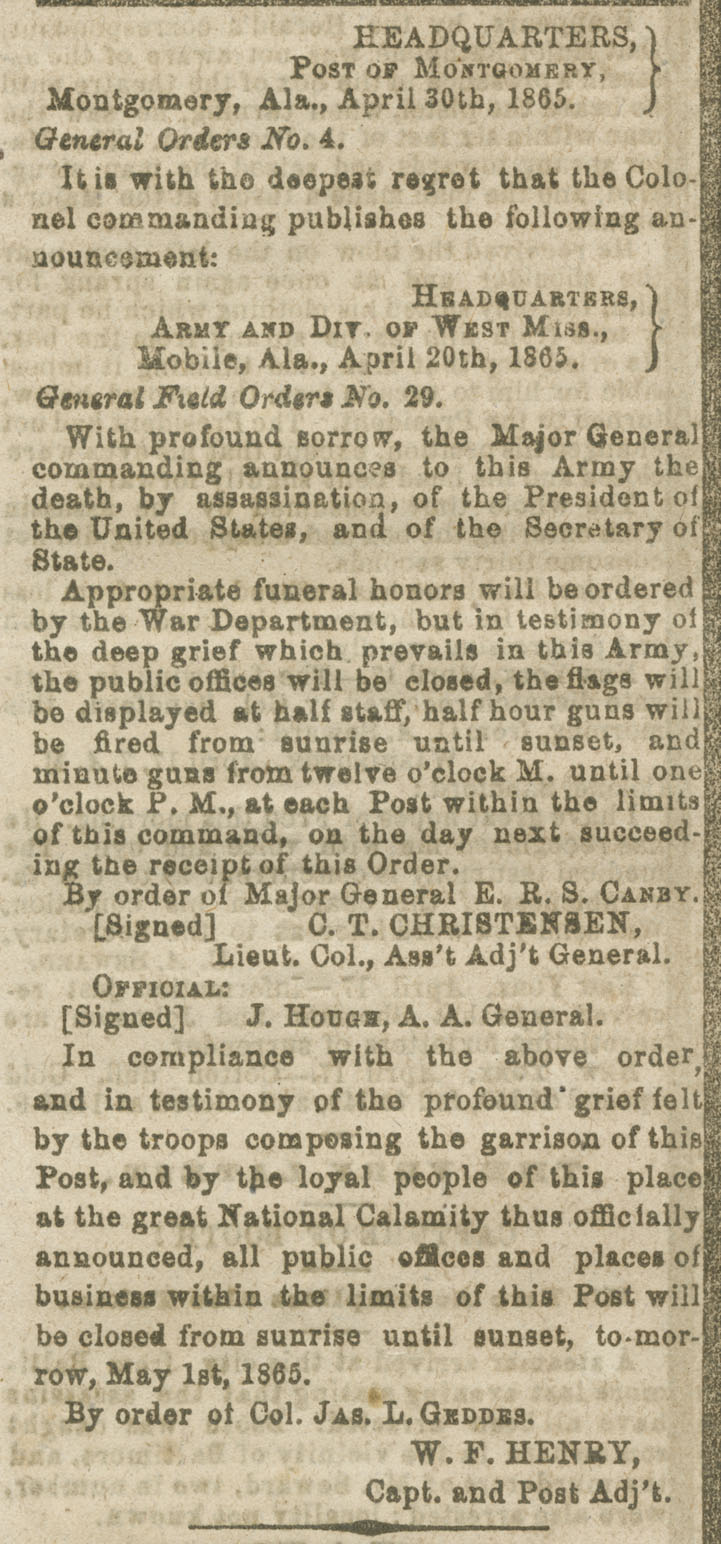
-
Description
The orders officially announce the assassination; close public offices and businesses; and arrange for other gestures of mourning. Published in the Montgomery Daily Mail on May 1, 1865.
-
Source
Excerpt from the Montgomery Daily Mail, book number ADVCOL39. Catalog record for this title is available here.
-
Rights
Use of this item for research, teaching and private study is permitted with proper citation and attribution, as defined here. Reproduction of this item for publication, broadcast or commercial use requires written permission. For permission, please contact the Alabama Department of Archives and History.
-
Creator
Montgomery Daily Mail
-
Date
May 1, 1865
from Jun. 8, 1865
"Mr. Lincoln - Some Anecdotes of Him."
-
Full Title
"Mr. Lincoln - Some Anecdotes of Him."
-
Description
Several brief stories illustrating President Lincoln's kind, patient, and congenial personality. All were submitted by a journalist from the New York World. They were reprinted in the Montgomery Daily Mail on June 8, 1865.
-
Source
Excerpt from the Montgomery Daily Mail, book number ADVCOL39. Catalog record for this title is available here.
-
Rights
Use of this item for research, teaching and private study is permitted with proper citation and attribution, as defined here. Reproduction of this item for publication, broadcast or commercial use requires written permission. For permission, please contact the Alabama Department of Archives and History.
-
Tags
-
Cite this Item
Montgomery Daily Mail. ""Mr. Lincoln - Some Anecdotes of Him."". Remembering Lincoln. Web. Accessed October 29, 2025. https://rememberinglincoln.fords.org/node/208
from Jun. 8, 1865
"Mr. Lincoln - Some Anecdotes of Him."

-
Description
Several brief stories illustrating President Lincoln's kind, patient, and congenial personality. All were submitted by a journalist from the New York World. They were reprinted in the Montgomery Daily Mail on June 8, 1865.
-
Source
Excerpt from the Montgomery Daily Mail, book number ADVCOL39. Catalog record for this title is available here.
-
Rights
Use of this item for research, teaching and private study is permitted with proper citation and attribution, as defined here. Reproduction of this item for publication, broadcast or commercial use requires written permission. For permission, please contact the Alabama Department of Archives and History.
-
Creator
Montgomery Daily Mail
-
Date
June 8, 1865
from May. 15, 1865
"Tone of the Eastern Press."
-
Full Title
"Tone of the Eastern Press."
-
Description
News and editorial opinions from several New York newspapers (such as the Times and the Tribune) regarding reaction to the assassination of Lincoln; the best strategy for dealing with former rebels; and the anticipated policies of Andrew Johnson's presidency. Published in the Montgomery Daily Mail on May 15, 1865.
-
Source
Excerpt from the Montgomery Daily Mail, book number ADVCOL39. Catalog record for this title is available here.
-
Rights
Use of this item for research, teaching and private study is permitted with proper citation and attribution, as defined here. Reproduction of this item for publication, broadcast or commercial use requires written permission. For permission, please contact the Alabama Department of Archives and History.
-
Tags
-
Cite this Item
Montgomery Daily Mail. ""Tone of the Eastern Press."". Remembering Lincoln. Web. Accessed October 29, 2025. https://rememberinglincoln.fords.org/node/207
from May. 15, 1865
"Tone of the Eastern Press."

-
Description
News and editorial opinions from several New York newspapers (such as the Times and the Tribune) regarding reaction to the assassination of Lincoln; the best strategy for dealing with former rebels; and the anticipated policies of Andrew Johnson's presidency. Published in the Montgomery Daily Mail on May 15, 1865.
-
Source
Excerpt from the Montgomery Daily Mail, book number ADVCOL39. Catalog record for this title is available here.
-
Rights
Use of this item for research, teaching and private study is permitted with proper citation and attribution, as defined here. Reproduction of this item for publication, broadcast or commercial use requires written permission. For permission, please contact the Alabama Department of Archives and History.
-
Creator
Montgomery Daily Mail
-
Date
May 15, 1865
from May. 6, 1865
"Meeting of Chaplains."
-
Full Title
"Meeting of Chaplains."
-
Description
Article reporting the organization of a new association for U.S. Army chaplains in Montgomery, Alabama. The group formed committees to arrange mourning services and adopt resolutions regarding the assassination of the president. The resolutions (included in the text) praise Lincoln; pledge a commitment to the principles he stood for; support the new president; denounce the murder (and "the bitter spirit of hatred and malice out of which it grew"); and promote a spirit of patience and kindness when dealing with the former rebels. Published in the Montgomery Daily Mail on May 6, 1865.
-
Source
Excerpt from the Montgomery Daily Mail, book number ADVCOL39. Catalog record for this title is available here.
-
Rights
Use of this item for research, teaching and private study is permitted with proper citation and attribution, as defined here. Reproduction of this item for publication, broadcast or commercial use requires written permission. For permission, please contact the Alabama Department of Archives and History.
-
Tags
-
Cite this Item
Montgomery Daily Mail. ""Meeting of Chaplains."". Remembering Lincoln. Web. Accessed October 29, 2025. https://rememberinglincoln.fords.org/node/206
from May. 6, 1865
"Meeting of Chaplains."

-
Description
Article reporting the organization of a new association for U.S. Army chaplains in Montgomery, Alabama. The group formed committees to arrange mourning services and adopt resolutions regarding the assassination of the president. The resolutions (included in the text) praise Lincoln; pledge a commitment to the principles he stood for; support the new president; denounce the murder (and "the bitter spirit of hatred and malice out of which it grew"); and promote a spirit of patience and kindness when dealing with the former rebels. Published in the Montgomery Daily Mail on May 6, 1865.
-
Source
Excerpt from the Montgomery Daily Mail, book number ADVCOL39. Catalog record for this title is available here.
-
Rights
Use of this item for research, teaching and private study is permitted with proper citation and attribution, as defined here. Reproduction of this item for publication, broadcast or commercial use requires written permission. For permission, please contact the Alabama Department of Archives and History.
-
Creator
Montgomery Daily Mail
-
Date
May 6, 1865
from Apr. 22, 1865
"Citizens' Meeting at Odd Fellows' Hall."
-
Full Title
"Citizens' Meeting at Odd Fellows' Hall."
-
Description
Article reporting a meeting in Mobile, Alabama, at which "the oldest and most prominent citizens" decried the assassination of President Lincoln: "All differences of political opinion were, for the nonce buried, and with one accord the people denounced in unmeasured terms the murderer - the dastardly assassin, of the President of the United States." The men issued resolutions to this effect and also one "of thanks to the army generally." Published in the Mobile Daily News on April 22, 1865.
-
Source
Excerpt from the Mobile Daily News, item number LN.1515. Catalog record for this title is available here.
-
Rights
Use of this item for research, teaching and private study is permitted with proper citation and attribution, as defined here. Reproduction of this item for publication, broadcast or commercial use requires written permission. For permission, please contact the Alabama Department of Archives and History.
-
Tags
-
Cite this Item
Mobile Daily News. ""Citizens' Meeting at Odd Fellows' Hall."". Remembering Lincoln. Web. Accessed October 29, 2025. https://rememberinglincoln.fords.org/node/205
from Apr. 22, 1865
"Citizens' Meeting at Odd Fellows' Hall."

-
Description
Article reporting a meeting in Mobile, Alabama, at which "the oldest and most prominent citizens" decried the assassination of President Lincoln: "All differences of political opinion were, for the nonce buried, and with one accord the people denounced in unmeasured terms the murderer - the dastardly assassin, of the President of the United States." The men issued resolutions to this effect and also one "of thanks to the army generally." Published in the Mobile Daily News on April 22, 1865.
-
Source
Excerpt from the Mobile Daily News, item number LN.1515. Catalog record for this title is available here.
-
Rights
Use of this item for research, teaching and private study is permitted with proper citation and attribution, as defined here. Reproduction of this item for publication, broadcast or commercial use requires written permission. For permission, please contact the Alabama Department of Archives and History.
-
Creator
Mobile Daily News
-
Date
April 22, 1865
from May. 8, 1865
"Shall a Lenient Policy Be Continued?"
-
Full Title
"Important Correspondence. Shall a Lenient Policy Be Continued?"
-
Description
Correspondence regarding a proposed policy of leniency toward citizens of Mississippi who wish to cooperate with the federal government. In the first letter, Brigadier General J. W. Davidson expresses concern that the strategy will not be adopted in light of the president's assassination. In the second letter, Major General Napoleon J. T. Dana restates his support of lenient treatment of the former rebels: "Even though contrary to my expectations, the rebel leaders in high position should ultimately be found to be implicated in the diabolical assassination of the President, I have no idea that the masses of the people or the subordinate officers will entertain any other feeling than that of utter abhorrence at the deed." The correspondence was originally published in the Vicksburg Herald on April 25, 1865, and it was reprinted in the Montgomery Daily Mail on May 8.
-
Source
Excerpt from the Montgomery Daily Mail, item number LN.1507. Catalog record for this title is available here.
-
Rights
Use of this item for research, teaching and private study is permitted with proper citation and attribution, as defined here. Reproduction of this item for publication, broadcast or commercial use requires written permission. For permission, please contact the Alabama Department of Archives and History.
-
Tags
-
Cite this Item
Montgomery Daily Mail. ""Important Correspondence. Shall a Lenient Policy Be Continued?"". Remembering Lincoln. Web. Accessed October 29, 2025. https://rememberinglincoln.fords.org/node/204
from May. 8, 1865
"Important Correspondence. Shall a Lenient Policy Be Continued?"

-
Description
Correspondence regarding a proposed policy of leniency toward citizens of Mississippi who wish to cooperate with the federal government. In the first letter, Brigadier General J. W. Davidson expresses concern that the strategy will not be adopted in light of the president's assassination. In the second letter, Major General Napoleon J. T. Dana restates his support of lenient treatment of the former rebels: "Even though contrary to my expectations, the rebel leaders in high position should ultimately be found to be implicated in the diabolical assassination of the President, I have no idea that the masses of the people or the subordinate officers will entertain any other feeling than that of utter abhorrence at the deed." The correspondence was originally published in the Vicksburg Herald on April 25, 1865, and it was reprinted in the Montgomery Daily Mail on May 8.
-
Source
Excerpt from the Montgomery Daily Mail, item number LN.1507. Catalog record for this title is available here.
-
Rights
Use of this item for research, teaching and private study is permitted with proper citation and attribution, as defined here. Reproduction of this item for publication, broadcast or commercial use requires written permission. For permission, please contact the Alabama Department of Archives and History.
-
Creator
Montgomery Daily Mail
-
Date
May 8, 1865
from May. 8, 1865
Editorial commenting on a rumor that "the assassination of Mr. Lincoln was planned in Canada and approved in Richmond."
-
Full Title
Editorial commenting on a rumor that "the assassination of Mr. Lincoln was planned in Canada and approved in Richmond."
-
Description
Though reluctant to believe that members of the Confederate government were involved, the author of the piece is very critical of their leadership (a "nest of conspirators that ruled this unfortunate section with the iron rod of despotism"). He also suggests that "Union men of the South...are far more deeply interested" in the president's death. Published in the Montgomery Daily Mail on May 8.
-
Source
Excerpt from the Montgomery Daily Mail, item number LN.1507. Catalog record for this title is available here.
-
Rights
Use of this item for research, teaching and private study is permitted with proper citation and attribution, as defined here. Reproduction of this item for publication, broadcast or commercial use requires written permission. For permission, please contact the Alabama Department of Archives and History.
-
Tags
-
Cite this Item
Montgomery Daily Mail. "Editorial commenting on a rumor that "the assassination of Mr. Lincoln was planned in Canada and approved in Richmond."". Remembering Lincoln. Web. Accessed October 29, 2025. https://rememberinglincoln.fords.org/node/203
from May. 8, 1865
Editorial commenting on a rumor that "the assassination of Mr. Lincoln was planned in Canada and approved in Richmond."
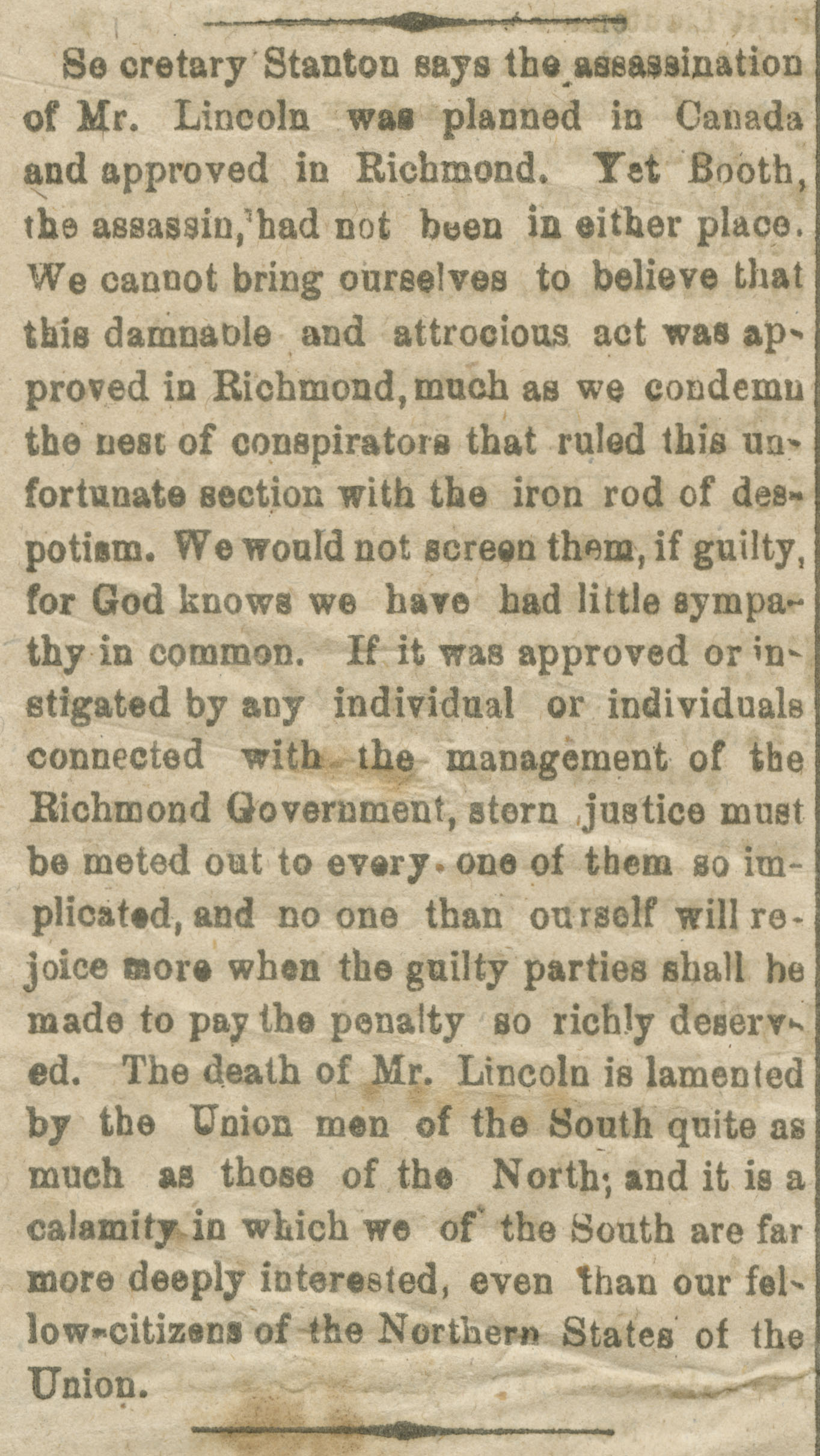
-
Description
Though reluctant to believe that members of the Confederate government were involved, the author of the piece is very critical of their leadership (a "nest of conspirators that ruled this unfortunate section with the iron rod of despotism"). He also suggests that "Union men of the South...are far more deeply interested" in the president's death. Published in the Montgomery Daily Mail on May 8.
-
Source
Excerpt from the Montgomery Daily Mail, item number LN.1507. Catalog record for this title is available here.
-
Rights
Use of this item for research, teaching and private study is permitted with proper citation and attribution, as defined here. Reproduction of this item for publication, broadcast or commercial use requires written permission. For permission, please contact the Alabama Department of Archives and History.
-
Creator
Montgomery Daily Mail
-
Date
May 8, 1865
